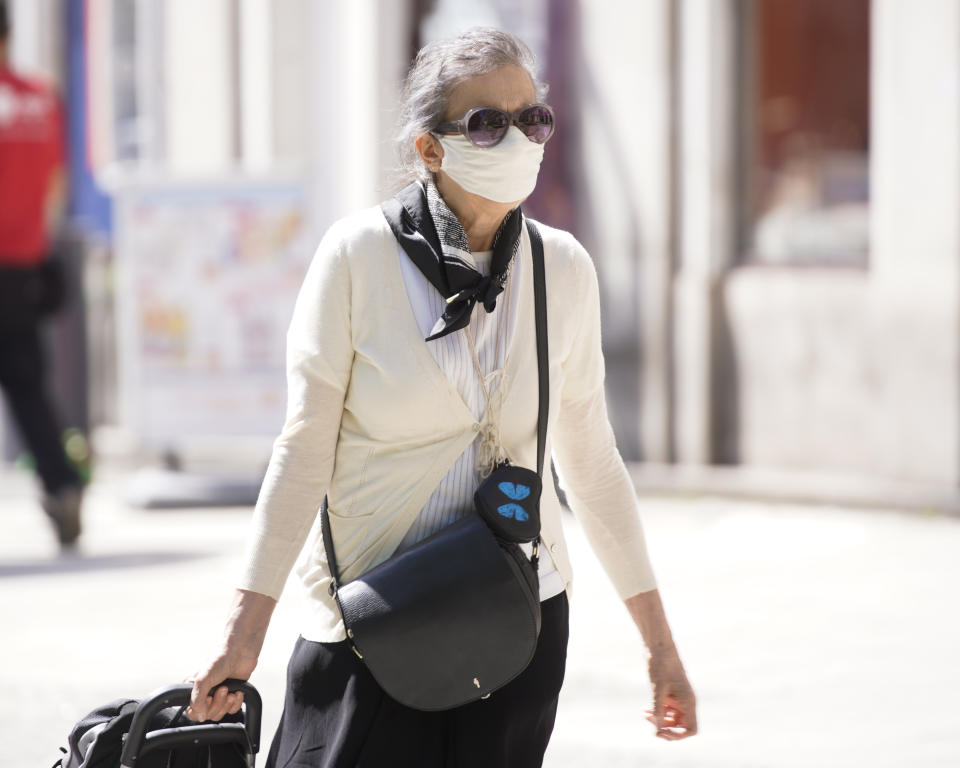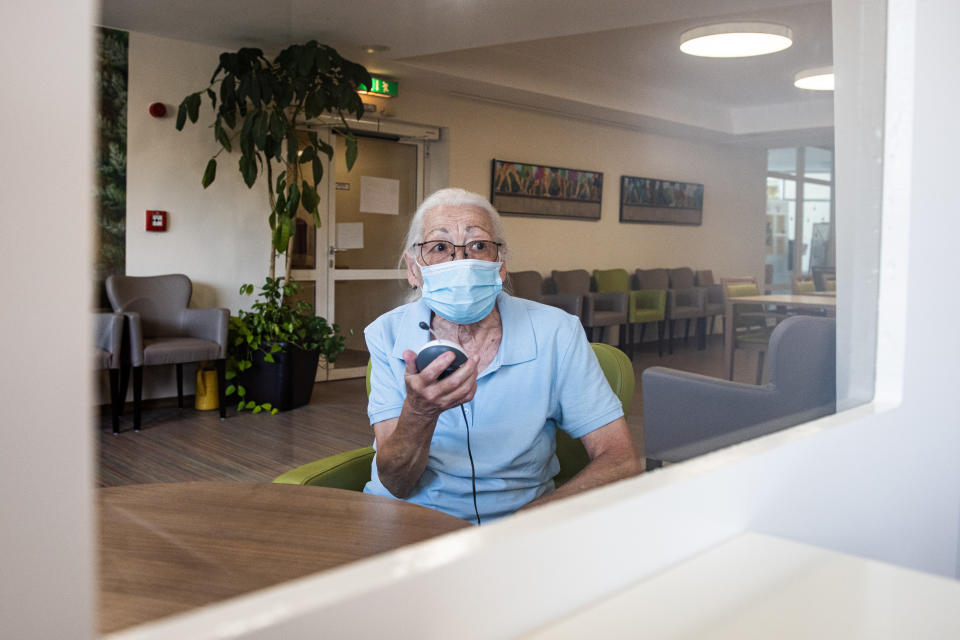Delirium 'a common but often missed coronavirus symptom in the elderly'

Delirium is a common symptom among elderly patients hospitalised with the coronavirus, experts have said.
It is defined as sudden confusion, which may leave an individual unable to think clearly, know where they are or pay attention. In severe cases, sufferers may even hallucinate.
Scientists from St Vincent’s University Hospital, Dublin, have called delirium “a missing piece in the COVID-19 pandemic puzzle”. COVID-19 is the respiratory disease that can be triggered by the coronavirus.
Early research suggests between 20% and 30% of all coronavirus patients develop delirium or a change to their mental status while in hospital, rising to 60% to 70% in particularly severe cases.
Elderly people are already more at risk of both delirium and coronavirus complications.

Delirium ‘very common’ in elderly patients
Speaking on a Royal Society of Medicine (RSM) briefing about how the coronavirus has affected older populations, Dr Jugdeep Dhesi from Guy’s and St Thomas’ NHS Foundation Trust said: “Delirium is a very common presenting sign; it’s often not recognised.”
Perhaps surprisingly, elderly patients do always develop the coronavirus’ tell-tale symptoms, like fever.
“Atypical symptoms are the only symptoms in around a third of elderly patients,” said Professor Adam Gordon from the University of Nottingham on the RSM call.
“[Abnormal signs of infection include] anorexia [which is] probably a manifestation of delirium [due to a reduced desire or ability to eat] and confusion.
“[Elderly people do not always develop] typical things like coughing or a loss of taste or smell”.
Scientists from Imperial College London looked at 394 residents and 70 staff from four nursing homes affected by the coronavirus in central London.
Two in five (40%) of the residents tested positive, of whom just under one in five (18%) had atypical symptoms only.
Anorexia and “confused or altered behaviour” were statistically significant symptoms among the residents.
Delirium ‘screening should be a standard of care’
The Royal College of Psychiatrists recognises delirium as a potential coronavirus symptom that “may present particular challenges in the context of the COVID crisis”.
Infections in general are a common cause of delirium, as is a change in environment or reduced oxygen levels in the blood.
“It can present in any patient, of any age, and is quite common post-operatively,” Professor Gordon told Yahoo UK. “Incidence, though, goes up with age.”
The coronavirus is usually mild, however, it can trigger pneumonia if the infection spreads to the air sacs in the lungs.
These then become inflamed and struggle to draw in air. As a result, oxygen levels in the blood fall and carbon dioxide accumulates.
A study in Wuhan, China – where the coronavirus outbreak emerged – found more than a third (36.4%) of 214 coronavirus patients had neurological symptoms, rising to just under half (45.5%) in those with a severe infection. Delirium was one of these symptoms.
A study in Strasbourg, France, found 26 out of 40 (65%) coronavirus patients in intensive care were noted as being confused.
A further analysis of 45 patients at the time of their discharge revealed 15 (33%) showed “inattention, disorientation or poorly organised movements in response to command”.
Research also found 40 out of 58 (69%) patients in intensive care were agitated, while 17 out of 82 (21%) who went on to die had “altered consciousness”.
A study review published in the prestigious The Lancet Psychiatry concluded: “[The coronavirus] might cause delirium in a significant proportion of patients in the acute stage.”
Neither the NHS, the World Health Organization nor the US Centers for Disease Control and Prevention specifically list delirium as a potential coronavirus symptom.
With older adults not always developing the infection’s tell-tale signs, the St Vincent scientists worry not including delirium in screening criteria may cause elderly patients to fall through the cracks.
“Delirium is an important missing component in the assessment and management of older people for COVID-19”, they wrote in the journal Age and Ageing.
“Guidelines should include delirium as a presenting feature, screening should be a standard of care, and non-pharmacological approaches for delirium prevention and management need to be implemented as early and often as possible.”
Medication can be a cause of delirium in itself, however, drugs are generally recommended if a person’s agitation leaves them distressed, or poses a threat to themselves or others.
Delirium can often be prevented and treated via hydration, explaining the situation to the patient, aiding sleep and easing any pain.
A toolkit put together by the Hospital Elder Life Program in Boston suggests encouraging patients to video call their loved ones, giving them a stress ball or even providing a mug of warm milk before bed can all help.
Although often preventable, Dr Dhesi warned delirium is “a good predictor of adverse outcome”.
Speaking to abc News, Dr Lorenzo Norris from George Washington University said: “Delirium is a medical emergency that is associated with increased morbidity and mortality.”
Despite often being associated with the elderly, The British Geriatrics Society has stressed “delirium is not exclusive to older people and may well be seen in any patient with severe infection”.

How does coronavirus cause delirium?
Early in the outbreak, scientists suspected the coronavirus affected the brain, given it commonly causes fatigue and a loss of taste or smell.
“The loss of smell is probably from a direct invasion of the olfactory nerve and that connects directly to the frontal lobes,” Dr Geriatrician Sharon Inouye told The Harvard Gazette.
The Strasbourg study revealed some of the patients’ MRI scans showed “light-up of the meningeal space”. This could be “another sign of viral encroachment into the brain”, he added.
It has been suggested the infection damages the blood brain barrier, leading to an immune-led attack on the central nervous system.
Inflammation brought about by the immune response to the virus may also trigger neurological symptoms.
This may be due to the rapid release of immune-fighting proteins, known as a cytokine storm.
Coronavirus: what happened today
Click here to sign up to the latest news, advice and information with our daily Catch-up newsletter
Read more about COVID-19
How to get a coronavirus test if you have symptoms
How easing of lockdown rules affects you
In pictures: How UK school classrooms could look in new normal
How public transport could look after lockdown
How our public spaces will change in the future
Help and advice
Read the full list of official FAQs here
10 tips from the NHS to help deal with anxiety
What to do if you think you have symptoms
How to get help if you've been furloughed

 Yahoo Lifestyle
Yahoo Lifestyle 

